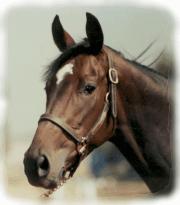A Horse, of Course with Don Blazer |
If you enjoy learning about horses, then you'll love our online courses. Each month you'll find a new column on our web site. We hope you'll enjoy it, and maybe e-mail us with questions or suggestions for other columns. A Horse, Of Course is a monthly column syndicated by Success Is Easy. If you like the column, call your local newspaper, or local horse publication and ask them to subscribe by contacting Success Is Easy. |
The Shot Heard Around the World Don Blazer copyright©2014 |

It was just one of those days.
Or, in this case, nights. Just over 227 years ago, Paul Revere rode into history. But as a lot of history, it wasn't reported very accurately. Not until Paul confessed at age 63 that his ride on April 16, 1775, was a disaster. His supposedly wild gallop from Boston to Concord to warn, "The British are coming," was really a slow stroll into a trap, which led to his capture by the British, which led to his failure to warn the Minutemen of Concord, which led to the loss of his horse, which didn't even belong to him. Paul had accepted his mission impossible and when he saw two lights appear in the church belfry he knew the British were crossing the Charles River and he was to go to Lexington first, then Concord. Deacon Larkin loaned his chestnut Narragansett Pacer to Paul for the ride. Although he never knew her name, he described her as a "very good horse." The Narragansett Pacer was unquestionably the most popular saddle horse in America at the time. Bred in Rhode Island in lush pastures bounded by the Atlantic and Narragansett Bay, the horses were on the small size, had good dispositions, great endurance, good manners and an ambling gait. Their gait made them very pleasant to ride even though they did not always pace--move both legs on the same side at the same time. This hearty little horse was much in demand by Caribbean planters who rode the sugarcane fields supervising their labor. The horse became a major economic influence on Rhode Island life. But by the time of the Civil War, a hundred years later, the breed was virtually extinct, a victim of mechanization and population growth. As Paul rode along at an ambling pace, he was spotted by two British soldiers who immediately pursued him. He escaped when one soldier rode his horse into a pond and his companion stopped to help. Revere arrived in Lexington in time to warn Samuel Adams and John Hancock, then he and Sam Dawes decided to ride on to Concord. They weren't in much of a hurry as they were averaging about 5 miles an hour. (A horse normally walks four miles per hour.) Fortunately for the American Revolution, Paul and Sam met Dr. Samuel Prescott who was on his way home to Concord after courting a young lady, not making a house on horse call. As they rode along, Dawes left the road to alert the occupants of a farm house. While he was gone four British soldiers captured Dr. Prescott and Paul. Prescott saw an opportunity to escape, put his spurs to his horse, raced across a pasture, jumped a stone wall and was off into the night. Revere tried to escape in the other direction, but raced head-on into six more British soldiers. He was recaptured. Dawes heard the commotion and galloped off toward Concord, but fell from his horse and was captured. Revere and the six soldiers started back for Lexington. After about a mile the commanding officer, Maj. Mitchell, ordered Paul to give his horse to a sergeant whose horse was tired. Paul did so, and was left to walk home. The British soldiers rode on to Lexington in time to retreat with their fellow redcoats. What happened to the Narragansett Pacer Revere rode that night is not known. However, it is a good bet Prescott was also riding a Narragansett Pacer, and he did reach Concord, spreading the word of the British advance. The minutemen were alerted and fired the shot heard around the world. Paul did not relate the true details of his ride for 23 years. He was just a bit embarrassed. Of course poet Henry Wadsworth Longfellow made the ride a heroic adventure in his poem the Midnight Ride of Paul Revere. And it was heroic, even if not successful. *First published in March, 2002; Success Is Easy/Don Blazer June 28, 2014 |